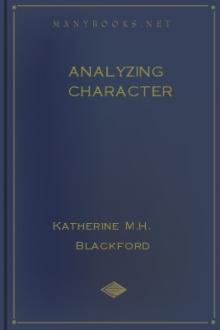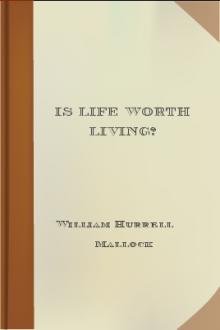Analyzing Character, Arthur Newcomb [popular romance novels .txt] 📗

- Author: Arthur Newcomb
- Performer: -
Book online «Analyzing Character, Arthur Newcomb [popular romance novels .txt] 📗». Author Arthur Newcomb
As their talk proceeded, President Jessup found that the gentleman was a Mr. Lynch, advertising manager of a firm manufacturing jewelry, located in Providence, Rhode Island. He had been in this position for five years and during that time had planned, assisted in designing, and sold to a national market several profitable jewelry specialties. Lynch's graphic story of how these advertising campaigns had been planned, executed, and carried through to success fascinated the President of the western concern. To his mind, his own enterprise, the manufacture and sale of steam and hot-water heating plants, had long been in the doldrums. He himself had spent many sleepless nights trying to plan some way of extending its business; of opening up new markets; of creating a wide new patronage; of manufacturing something which would bring in more profits than their regular line, and finding a successful sale for it. It now seemed to him that he had found just the man to assist him in carrying out these vaguely formed plans, which as yet were little more than dreams. He told Lynch something of his ideas and ideals, and, as the two men parted for the night, he said:
"I have just a glimmering of an idea, Mr. Lynch, that we might be able to make an arrangement whereby you would be greatly profited in increased opportunities and bigger income, and perhaps we also would reap an advantage in increased business. Think it over."
SELECTION BY PERSONAL PLEASURE
Long after he had retired, President Jessup pondered over the situation, and the more he pondered, the more he became convinced that he had found just the man he wanted. True, he had not had in mind, during any of his midnight vigils, the taking on of any new help—his payroll was already heavy enough. He had a good advertising manager and a good sales manager, men who were competent to take care of the business of the concern. In response to their efforts, patronage was growing, not rapidly and spectacularly, yet steadily and substantially. Now, however, he saw an opportunity to produce something which would be different enough from the product of any of his competitors to warrant him in undertaking a national advertising campaign. Up to the present he had had only a local business. A few hundred miles from his factory in all directions could be found all the heating plants which he had manufactured and sold. His dream was to produce some special form of apparatus which would sell wherever there were homes, stores, offices, churches, theaters, and schools to be warmed. Mr. Lynch was just the man to study their business carefully, decide upon some such product, help to design it, and plan and execute the national advertising campaign which would develop a local into a national business. Jessup dropped to sleep with his mind made up.
Next morning, as the train sped along between the Catskills and the Hudson, the two men, over the breakfast table, began negotiations. Jessup was surprised, and somewhat disappointed to find what a large salary his new friend was drawing in Providence. He was still more surprised and disappointed to find that Lynch's future prospects in the jewelry business were so bright that it would take a considerably larger salary to entice him away. The Westerner's mind, however, was made up and the future profits he saw arising from a national business were so attractive that he finally threw aside caution and offered Lynch twelve thousand five hundred dollars a year and moving expenses to the western city where his factory was located. This offer was finally accepted, the two men shook hands, and arrangements were made for Lynch to report for duty in the West within thirty days.
THE NEW MAN IN A QUANDARY
Now, President Jessup had no intention of dismissing his advertising manager and his sales manager. Each knew the business from beginning to end; each was thoroughly familiar with the trade already built up and personally acquainted with many dealers who handled the products, and could be depended upon not only to hold the present trade, but to increase it. Therefore it seemed good judgment to retain these two men on the local trade while turning Lynch loose upon the campaign for the securing of a national market. So it was decided to retain both of the old men and to give the newcomer the title of sales promotion manager. There were some heart-burnings on the part of those already in the office when the new man came in and took charge. It was not pleasant for men who had been with the business for years and served it faithfully and helped to build it up, to have a man placed over them who knew nothing about it and whose salary was more than their two salaries combined. However, Lynch's personality was so pleasant and he was so tactful and agreeable that this little feeling of inharmony seemed soon to disappear. Presently all were working together in the happiest possible way toward the inauguration of the new policy of the concern.
As time went on, however, Lynch began to show signs of restlessness and uneasiness. Being a man of keen, alert mind and quick intelligence, he had quickly grasped the fundamentals of the heating business. He was soon able to talk with the firm's designers and engineers in their own language. But the more he studied boilers and radiators, the less interest he took in them. He had sense enough to know that the only thing that would win in the plan he had in mind was a radical change in design which would increase the amount of heat delivered in proportion to the amount of fuel burned, or the amount of heat delivered in proportion to the cost of fuel burned, or would reduce the amount of supervision required, or would do away with some of the long-standing sources of trouble and annoyance in heating apparatus. Long and hard he thought and conjectured, and studied statistics, and followed reports of experiments, but for the life of him he could not take any interest in any such line of research. He hated the gases, ashes, soot, smoke, and dirt generally. Huge rough castings of steel and iron seemed gross and ugly to him, and the completed product seemed coarse and unfinished. The only improvements he could think of were improvements in beauty of line, in refinement of the design, in added ornamentation, and other enhancements of the physical appearance of the product. In these he took some interest, but he had the good sense to know that no change of this kind would accomplish what they wished in the matter of going after a national market.
THE HIGH-SALARIED ONE FAILS
For a while President Jessup waited patiently; then, as the big salary checks came to him to be signed month after month, he began to grow restless. No result had yet been announced and in his conferences with Lynch, he could not determine that any hopeful progress was being made. Finally, in desperation, he called his engineers and designers together. For three weeks he worked with them night and day, studying, analyzing, making records, and computing results. They took cat-naps on benches in the laboratory while waiting for fires to burn a standard number of hours; ate out of lunch-boxes; and finally, unshaven and covered with soot and ashes, they triumphantly produced a fire-box and boiler which would burn the cheapest kind of coal screenings satisfactorily, with but little supervision and a high degree of efficiency. This was the best thing they had ever done in the laboratory. This was the attainment which he had so long desired. This, properly advertised and handled, certainly ought to revolutionize the steam and hot-water heating business. But it was not one of Lynch's brain-children. However, Lynch would now have an opportunity to prove his value and return to the concern large profits for the amount they had spent and would spend upon him. At any rate, he knew how to plan and conduct an advertising and selling campaign.
Lynch, intensely relieved by the solving of this problem, the utility of which he very readily saw, threw himself, heart and soul, into the construction of the advertising campaign. As this work progressed, Jessup began to have some misgivings. While the advertisements, circulars, catalogues, and other literature were beautiful; while the English in them was elegant, and the form of expression refined, somehow or other, they seemed to lack the necessary punch or kick which Jessup knew they ought to have. The two big things about the new product were, first, economy of fuel; second, ease of operation and small demand for supervision. These points were not brought out clearly enough. They did not grip. They did not get home as they should. There was a good deal of talk in all the advertising about the beauty of the new apparatus; about the refinement of its finish; about its workmanship, and many other things which, to Jessup's mind, detracted from the main issue. The one thing he wanted to hammer into the minds of the readers of his advertising was the fact that here was a heating apparatus for which fuel could be purchased in the usual quantities and at half the regular price. What he wanted to do was to make them actually see the dollars and cents saved, not only in fuel, but also in the cost of operation. He wanted suburbanites to see the fact that they could attend to their furnaces each morning before going to town, and that the fires would not need any further attention until the following morning; but, somehow or other, the advertising did not seem to picture this clearly enough. The statements were made, yes; there was plenty of evidence produced to show this; but it was done in a way which, somehow or other, did not produce an intense conviction.
Jessup had secured from his board of directors an appropriation of fifty thousand dollars for a national advertising campaign. Upon the result of his first attempt would depend his securing a further appropriation for such a campaign as he had planned and as he wanted to execute. This being the case, he did not feel that he was justified in permitting Lynch's advertising to go out as it was. The result was that, just before the time came when copy must be sent to the magazines, newspapers, and street-car advertising companies, Jessup called his old advertising manager into conference and for a week they struggled together, revising the copy, rewriting the selling argument, and placing emphasis in clear, strong, unforgetable figures where it would do the most good.
WHY THE "GREAT FIND" WAS A DISAPPOINTMENT
The result of all this was that Lynch, seeing the writing on the wall, tendered his resignation—which was all too gladly accepted. In offering his resignation, however, Lynch had stipulated that he was to receive four thousand dollars out of the six thousand five hundred still due him on his year's contract. President Jessup's error in selecting an employee had cost him ten thousand dollars in salary. Besides this was the still larger sum in expenses, in wasted effort, and in the disorganization of his entire factory and selling force as the result of the introduction of a man who did not belong there.
His mistake was due to two fundamental errors. In the first place, the facts that a man is personally agreeable, that he belongs to the same political party, that he belongs to the same lodge or fraternity, that his ideas and opinion on matters outside of





Comments (0)